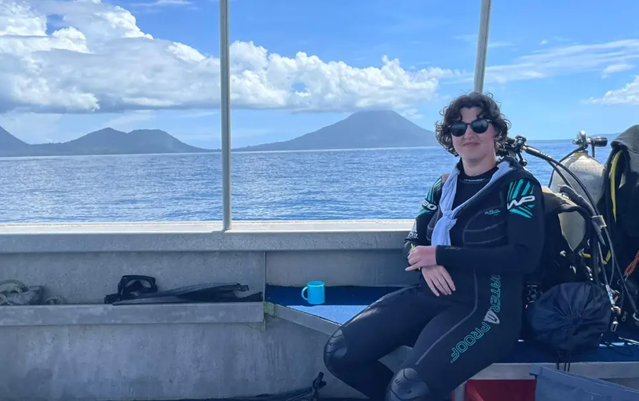In our Graduate in Focus series we look at the achievements of our MSc graduates who have excelled in marine science around the world since studying with us. Today we meet Lucia Yllan, MSc Marine Vertebrate Ecology & Conservation graduate (2021) and now a PhD student at Newcastle University working on the role of acoustic cues in anemonefish hierarchies.
What have you been doing since leaving Exeter? And what do you enjoy most about your work?
Since finishing the Msc Marine Vertebrate Ecology and Conservation, I have participated in two research projects on anemonefish social hierarchies in Papua New Guinea and started my PhD at Newcastle University working on the role of acoustic cues in anemonefish hierarchies. The thing I enjoy the most about my work is travelling to other parts of the word to dive and enjoy the beauty of the marine life.
What did you enjoy most about your programme and what was the biggest highlight?
What I enjoyed the most about the programme was the seminars where researchers form other universities, NGOs or other research groups would come to talk to us about their work which I found very inspiring. It also was a great opportunity to network and, nowadays, one of the researchers that came to give us a talk is one of the collaborators of my PhD project.
Why did you choose to study at the University of Exeter and what did you enjoy most about studying here?
The first thing that caught my attention from Exeter University was the master course that they were offering which perfectly aligned with what I wanted for my career and also included fieldwork opportunities. Also, as an international student and non-native English speaker, the fact that the university offered so many courses and one-on-one meetings to support non-English speakers and help them improve their skills in English was also something that help me decide to enrol in this university.
The thing I enjoyed the most about studying at Exeter, was the opportunity to learn from experienced researchers who were always keen on helping you out if you needed it, and how the modules and assignments were always oriented towards preparing us for an actual work setting.
What skills and experiences from your course have been most useful for your career?
The skills that have help me the most in my career have been my skills in statistical analysis which I believe are key for any researcher, and also my English writing skills which greatly improved in my time studying at Exeter University thanks to all the feedback I received from the language team and the lecturers from my modules.
What advice would you give to a current student who wishes to pursue a similar career?
My main advice is to try to get in contact with as many people as you can when you are studying. Let senior researcher know that you are interested in their research topics and volunteer to help as much as you can. This helps you create a network and also build your skills, which will bring you a lot of opportunities in the future.
What are your plans for the future?
My plan for the future, after I finish my PhD, is to do a Post-doc and keep on working on fish behaviour which is a topic that fascinates me. I also have an interest on teaching and outreach and I would like to continue doing so in the future.
Interested in studying with us? Our world-leading marine research underpins a wide range of undergraduate and postgraduate programmes: Research-led teaching | Exeter Marine | University of Exeter

